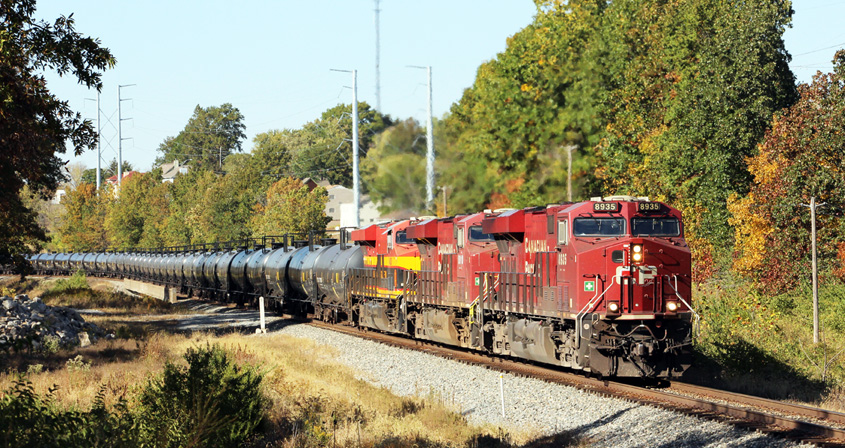All about the community of model railroading and rail enthusiasm
March 24, 2023 / Updated July 25, 2023
From News Releases
The new CPKC, formed by last week’s Canadian Pacific-Kansas City Southern merger, is expected to begin operations April 14 but will be under the watchful eye of the Surface Transportation Board (STB).
The STB concluded a lengthy review and approved the merger March 15 with conditions, including an unprecedented seven-year oversight period. Many stipulations designed to mitigate environmental impact, preserve competition, protect railroad workers and promote efficient passenger rail are also in the STB’s 212-page decision.
As with any proposed merger, STB said it considered whether combining the railroads would create inequities in competition. The board noted in its decision that CP and KCS have few competing lines in their plan, which creates the first railroad providing single-line service spanning Canada, the U.S. and Mexico.

“CPKC will continue to be the smallest Class I railroad, with a network that is a few thousand route miles shorter than the next smallest Class I and half the size of the Western railroads,” the STB wrote. “The transaction is end-to-end, meaning there are little to no track redundancies or overlapping routes between the railroads; they connect only in Kansas City.”
STB said the transaction will reduce travel time for traffic moving over the single-line service, increase incentives for investment and eliminate the need for the two now-separate CP and KCS systems to interchange traffic moving from one system to the other.
“This will enhance efficiency, which in turn will enable the new CPKC system to better compete for traffic with the other larger Class I carriers.”
The merger has substantial support from shippers, but wheat growers were disappointed. In 2022, North American railroads moved 1.6 million grain carloads, according to the Association of American Railroads. Of that, Canadian railroads moved 428,500 carloads.
In a joint statement, U.S. Wheat Associates (USW) and the National Association of Wheat Growers (NAWG) said STB has approved rail consolidation without regard for the consequences on agricultural shippers from lack of competition in the U.S. rail sector.
“U.S. rail industry consolidation has led to poorer, not improved, service for agricultural shippers,” said USW President Vince Peterson. “In addition, we see extreme disparity in rates for wheat shippers. Rail rates over the last decade have increased exponentially and rates for wheat are higher than rates for other commodities even with similar handling characteristics. Those higher rates make U.S. wheat less competitive in the global market at a time when higher prices already hurt our competitiveness.”
STB says it recognizes that even end-to-end transactions such as CPKC may pose some anti-competition risks and is imposing numerous conditions to preserve existing rail service options at affected gateways, or interchange points between CPKC and other railroads. This “should ensure competitive options are not reduced for shippers served by CP or KCS.”
The conditions apply equally to existing and new service. If CPKC increases its rates to an affected gateway by more than inflation, shippers can challenge the decision, a move never authorized before.
CPKC would have to give shippers written justification for the increase so that shippers could evaluate whether the increased rates are challengeable. The shipper could challenge the commercial reasonableness of CPKC rates or service at affected gateways in a streamlined process or in arbitration.
The decision also restricts CPKC from terminating reciprocal switching access for shipper facilities served by CP or KCS that have such access today.
Since late October 2021 when CP and KCS filed their merger application, the board has reviewed nearly 2,000 comments and other filings and held a seven-day public hearing. In addition, its Office of Environmental Analysis held seven public meetings, all attended by at least one board member, and conducted an analysis that produced a comprehensive Final Environmental Impact Statement of more than 5,000 pages including appendices.
CP and KCS are already working to combine operations, including establishing an executive team for CPKC.
CP CEO and President Keith Creel will guide CPKC and says the merger will stimulate competition, create jobs, lead to new investment in the rail network and drive economic growth.
“Our new combined railroad will create a truly unique single-line network connecting three nations and instantly injecting new competition into the North American rail industry when our supply chains have never needed it more,” he said. “The public, environmental, competitive and safety benefits of this historic combination, clearly recognized by the U.S. Surface Transportation Board, are extraordinary for our employees, communities, rail customers and the North American economy.”
KCS President and CEO Patrick J. Ottensmeyer agreed to continue advising Creel through the remainder of 2023 to ensure continuity on key initiatives predominantly involving the combined company and Mexico. CP completed its $31 billion (US) acquisition of KCS on Dec. 14, 2021. Immediately, KCS shares were placed in a voting trust that ensures KCS operates independently of CP during the regulatory review process. Until CP exercises control pursuant to the STB decision and the voting trust is dissolved, CP and KCS will continue to operate independently.